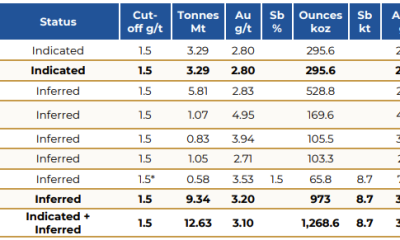Precious Metals
Tether Revealed To Be Once Backed By Chinese Securities, So They Are Giving Away Tether Gold To Make Amends
Documents released by New York’s Attorney General reveal that Tether Holdings, the issuer of the USDT stablecoin, had previously included
The post Tether…

Documents released by New York’s Attorney General reveal that Tether Holdings, the issuer of the USDT stablecoin, had previously included securities issued by Chinese companies among its reserves. The revelation confirms long-standing speculation about Tether’s exposure to Chinese commercial paper.
Furthermore, it was discovered that Tether’s reserves consisted of billions of dollars in short-term loans to Chinese companies and a significant loan to crypto platform Celsius Network.
The quality of assets backing USDT has long been a subject of scrutiny due to its crucial role in crypto markets. Traders rely on this stablecoin, which has a circulation of about $83.5 billion, for various purposes such as moving money into and out of cryptocurrency markets, fund swapping between exchanges, and seeking stability during volatile times. The potential inability of Tether to redeem tokens for dollars could severely shake confidence in the cryptocurrency world.
Earlier this year, Tether reached a settlement with the NY Attorney General’s office over allegations of misleading statements about its reserves and hidden losses.
“In moments of global financial uncertainty, like the current one, we believe it’s important to give a strong signal to our community. Prioritizing openness, stability and liquidity is at the core of Tether,” the firm said in a tweet.
As part of the settlement, Tether provided extensive documentation through the law firm Steptoe, including letters, bank accounts, reserve holdings, and wallet addresses. The documents also outlined procedures for detecting money laundering.
The release of these documents came in response to a freedom of information request, shedding light on Tether’s holdings and practices. The documents reveal that Tether held securities issued by major state-owned Chinese companies, including Industrial & Commercial Bank of China Ltd., China Construction Bank Corp., and Agricultural Bank of China Ltd. The securities matured between 2020 and 2021.
Additionally, Tether held securities issued by other prominent entities such as Deutsche Bank AG, Barclays Bank Plc, and ArcelorMittal SA.
Related to the issue, the crypto firm decided to distribute free Tether Gold, its so-called gold-backed stablecoin, “to restore market sentiment and reward [its] holders for staying loyal during the depeg.”
The not-so-stable stablecoin
Stablecoin issuers like Tether claim that their tokens are backed one-to-one with primarily cash and cash-equivalents, maintaining their peg to assets like the US dollar. While there are stablecoins with alternative mechanisms, they are not as widely used as USDT and the second-largest token, USDC.
The documents also shed light on Tether’s banking relationships, lending activities, and investments. Tether had significant loans to third parties, totaling $5.1 billion, secured by collateral in the form of digital assets or securities. The company had accounts at various banks in the Bahamas, including Deltec Bank & Trust and Ansbacher (Bahamas) Limited, as well as relationships with Bradbury Investment and Metis Global Partners. It also held reserves in gold storage amounting to over $2 billion. Tether’s operational accounts were primarily held at Deltec and Far Eastern International Bank, and the company clarified that reserve funds were not used for operational purposes.
In October 2021, Tether had 69 billion Tethers in circulation, meaning it had assets of $69 billion if its stable coin is backed by US dollar at a one-to-one ratio. But as Bloomberg reporter Zeke Faux discovered, the company operates more as a bank, because it exchanges US dollars from crypto traders for an equal amount of Tethers, which the traders can then use to bet on the prices of various other cryptocurrencies such as bitcoin, ethereum, or any other meme-inspired coin of their choosing.
Faux also discovered that Tether made billions of dollars in loans to other crypto companies, using bitcoin as collateral. Alex Mashinsky, founder of Celsius Network and one of the borrowers, revealed that he took out a $1 billion loan from Tether, for which he pays a 5% to 6% interest rate.
Afterwards, the Commodity Futures Trading Commission fined Tether $41 million over making false claims that each of its stablecoins in circulation were “fully backed” by one US dollar.
The regulatory body alleged that for at least the duration of mid 2016 to February 25, 2019, Tether “misrepresented to customers and the market” that it held US dollars in its accounts equivalent to the number of stablecoins, or USDTs, issued into circulation. Rather, Tether owned an equal amount of dollar reserves “for only 27.6% of the days in a 26-month sample time period.”
Tether has been fighting off in court inquiries about the details of how its stablecoin is backed, particularly a freedom of information request from Coindesk. New York Supreme Court Justice Laurence Love ruled earlier this year that he is denying and dismissing a petition made by iFinex and related companies, which is said to include both Tether and Bitfinex, to block the request made by Coindesk to the NY Attorney General.
“Petitioners having failed to establish that substantive competitive injury requirement under FOIL has been here met, the Court notes that there is a strong public interest in the disclosure of the requested information .. Petitioners have at all times represented to the public that that every outstanding tether was “backed” by, and thus should be valued at, one U.S. dollar… However, said statements have been found by OAG to be misleading. As established by Respondents’ papers, not only OAG but multiple federal agencies are concerned with Petitioners’ lack of transparency and possible commission of crimes,” the judge said.
In September 2022, Tether was ordered by the Southern District Court of New York to produce the documents being requested by the plaintiff in its crypto asset litigation case against Bitfinex, including “those sufficient to establish USDT Reserves.” At the center of the case was determining whether Tether issued the USDT with a misrepresented backing of reserves and was then exchanged within the Bitfinex platform to inflate the price of bitcoin.
After the court order was handed down, Tether immediately tried to downplay the development, saying it, “is a routine discovery order and does not in any way substantiate plaintiffs’ meritless claims.”
“We had already agreed to produce documents sufficient to establish the reserves backing USDT, and this dispute merely concerned the scope of documents to be produced,” the company said in its blog.
The long and winding “audit”
Tether CTO Paolo Ardoino, in responding to a tweet asking him if the firm would be willing to share its detailed current holdings, said that it’s what the company is doing in their attestations with their accounting firm BDO Italia.
In August 2022, Tether announced that it had switched accounting firms to sign off its attestations of its financial situation to the Italian member of accounting firm BDO.
“Our commitment to transparency and the community is a long-standing pillar in the underlying ethos of the company and aligns with our responsibility as a market leader,” said Ardoino at the time. “We have once again demonstrated that commitment by aligning with BDO, one of the world’s top accounting firms.”
Then, just a day after, the firm released an independent auditor report, which was really an assurance opinion on the company’s consolidated reserves report (CRR) as declared on June 30, 2022.
“In our opinion, the CRR as prepared by the management of [Tether and its subsidiaries] as of June 30, 2002, is, in all material aspects, fairly presented in accordance with the criteria, including Management’s Key Accounting Policies, set out therein,” BDO Italia’s report concluded.
At the surface, the report looks like the previous attestation’s on Tether’s asset valuations. BDO Italia also stamped its unmodified opinion on the stablecoin firm’s report, same with the previous accounting firm, MHA Cayman, in its earlier quarter report.
One of the few stark differences is the reports’ titles: BDO Italia’s says it’s an “independent auditor’s report” while MHA Cayman’s says it’s an “independent accountant’s report”. However, both reports never mentioned that the report was an audit of the company.
BDO Italia’s report specified that its responsibility is to “express [its] conclusion based on the procedures performed about the compliance of the CRR with the criteria, including Management’s Key Accounting Policies, set out therein.”
After the release of documents by the NY Attorney General, when pressed for a full audit, Ardoino replied that while the firm is striving to demonstrate transparency, it seems like it’s an “always-room-for-improvement” kind of situation.
“If you look at our history we overcame insane scrutiny, pressure etc and always provided further transparency. [Of course] we can always do better and our journey in that sense is not finished.
Every quarter we’ll do better,” Ardoino tweeted.
Chinese ties
The crypto firm has been consistently marred with issues of its Chinese ties. Tether maintained in September 2021 that it did not own any commercial paper, debt, or securities tied to the troubled Chinese real estate firm Evergrande and denied ever holding any of the company’s assets in the past.
“As we have indicated in our published statements and in our most recent assurance attestation with a reporting date of June 30, 2021, the vast majority of the commercial paper held by Tether is in A-2 and above rated issuers,” a spokesperson affirmed.
In the same Bloomberg article by Faux, it was disclosed that Tether reserves are comprised of billions of dollars in short-term loans to various Chinese companies—something that typically remains untouched by mainstream money-market funds. Although denying ties to Evergrande, its lawyer declined to disclose exactly which Chinese commercial paper Tether does own. The lawyer did however reassure Faux that the majority of Tether’s commercial paper holds high ratings from credit rating agencies.
With the Chinese commercial paper, bitcoin-backed loans, and Tether’s entire $69 billion in mind, if the not-bank were to even earn a 1% return on its entirety of reserves, its team of executives would be earning a hefty $690 million yearly profit.
However, back in December 2022, Chinese authorities arrested numerous people accused of using USDT to launder nearly $2 billion in illicit funds procured from ponzi schemes, gambling, and other illegal activities.
The police have arrested 63 individuals for using cryptocurrencies to launder as much as $1.7 billion (12 billion Chinese yuan). Allegedly, the gang has been converting proceeds obtained from pyramid schemes, gambling and fraud into the tether stablecoin since May 2021. Since the beginning of the investigation, which started in July 2022, authorities have seized nearly 130 million yuan worth of illegal cash.
The release of these documents not only provides insight into Tether’s practices but also brings back memories of the tumultuous summer of 2022 when crypto markets experienced a significant decline due to the collapse of algorithmic stablecoin TerraUSD. Tether faced speculation about its reserves during that time and had to address rumors regarding its commercial paper portfolio, which were deemed false.
It is important to note that Tether made a loan to Bitfinex, which was fully repaid in early 2021. Bitfinex, which shares an affiliation with Tether, had previously borrowed over $600 million from the stablecoin issuer in a transaction that became public in 2019 when the NY Attorney General alleged that the exchange lost $850 million to payment processor Crypto Capital Corp.
Information for this briefing was found via Bloomberg and the sources mentioned. The author has no securities or affiliations related to this organization. Not a recommendation to buy or sell. Always do additional research and consult a professional before purchasing a security. The author holds no licenses.
The post Tether Revealed To Be Once Backed By Chinese Securities, So They Are Giving Away Tether Gold To Make Amends appeared first on the deep dive.

Canadian Silver Co. Will See Big Changes in 2024
Source: Michael Ballanger 12/22/2023
Michael Ballanger of GGM Advisory Inc. takes a look at the current state of the market and shares on stock…
EGR options out Urban Berry project in Quebec to Harvest Gold – Richard Mills
2023.12.23
EGR Exploration Ltd. (TSXV: EGR) has moved from owner to shareholder at its Urban Berry project in Quebec, this week announcing it is optioning…
Crypto, Crude, & Crap Stocks Rally As Yield Curve Steepens, Rate-Cut Hopes Soar
Crypto, Crude, & Crap Stocks Rally As Yield Curve Steepens, Rate-Cut Hopes Soar
A weird week of macro data – strong jobless claims but…














